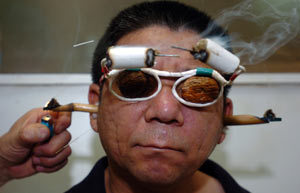Green energy powers grasslands
Updated: 2010-11-24 07:59
By Li Xing (China Daily)
Preliminary work is being conducted and the prefecture hopes to be able to build five solar power stations with a combined capacity of 5 million kW on its deserts, according to the local plan that is awaiting approval from the Energy Bureau of the National Development and Reform Commission.
|
 An example of the renewable energy mix of solar and wind power that is employed in the grasslands of Inner Mongolia. [Photo/China Daily]
|
 |
|
In the control room at Shangdu power plant, which is equipped with an advanced desulphurization process to reduce pollution and a dry cooling system to reduce water use. [Photo/China Daily]
|
Other resources
Once ranked first in Inner Mongolia in terms of average per capita income, Xilin Gol now lags behind Erdos, which has risen as one of the wealthiest areas in China for tapping its coal resources.
Yet, Xilin Gol has the second largest coal reserve in Inner Mongolia - 144.8 billion tons - and has China's largest reserves of lignite, also known as brown coal.
Experts have found at least five mines with reserves of at least 10 billion tons of brown coal, which is the lowest rank of coal but also low in sulfur and phosphorous. In the developed countries, it is used almost exclusively as fuel for electric power generation.
Moreover, the coal is invariably deposited close to the surface, making it commercially viable to extract with open-pit mining. In fact, the national and regional development and reform commissions have already approved 12 mine projects in Xilin Gol, with production set to reach 100 million tons this year. Four of the pits are major projects under the 11th Five Year Plan (2006-2010).
Yu and his colleagues have also proposed that at least four major power plants are built beside or close to the mines to save on the amount of diesel used in transport, as well as other materials used in road construction, and thereby reducing the overall carbon footprint. "Sending electricity inland is more economical and leaves fewer carbon footprint than transporting coal down south," he said.
At the Shangdu power plant, where coal arrives by train from an open-pit mine 213 km away, many new technologies have helped to make it green. It is equipped with an advanced desulphurization process to reduce pollution and a dry cooling system imported from Germany to reduce water use by 80 percent.
With four 600,000-kW units already in operation, the plant accounts for roughly 78 percent of all electricity generated in Xilin Gol and sends the power directly to grids covering Beijing, Tianjin and the city of Tangshan in Hebei province.
"We're proud we help maintain the steady supply of electricity in our nation's capital," said Bian Guangping, the plant's deputy general. "We won a national award for our contribution to the Beijing Olympics in 2008."
The cost to operate the power plant is actually much lower than similar facilities in the Yangtze River valley, which have to pay a lot of money for coal transportation. Bian said his plant also collects waste residue from burned coal.
The prefecture's development and reform commission plans to build additional factories to process waste residue from other power plants in the coming years, said director Yu.
Officials hope to extract rare minerals, such as germanium, an important semiconductor material with multiple uses ranging from transistors and various other electronic devices, fiber-optic systems and infrared optics to solar cell applications.
Research indicates the prefecture not only has a rich coal reserve but is also rich in 14 minerals, including iron, copper, chromium, lead, zinc, tin, tungsten, silver, germanium, bismuth, indium, gallium, cadmium and gold.

Ecological concern
To fulfill their ambition, officials in Xilin Gol must deal with the impact of energy development on the ecology and environment. It is a grave challenge for the drought-plagued area to build additional coal-fired power plants, even with better technologies that consume less water.
Open-pit mines are notorious for causing dust and soil erosion, so strict rules have been set for operators, said Bai Jinsheng, deputy head of the prefecture's major project office.
"We must make sure extraction of coal results in the least possible amount of dust," he said. "The companies that operate the mines must also promise to green the area piled with top soil from the mines."
Other conditions include wind farms and coal-fired and solar power plants being built away from nature reserves, while wind turbines must be placed as far away from herders' houses as possible.
However, Hata in Sonid said he thinks that several wind turbines erected on grassland his family owns are a bit close to home. "The noise from the turbines get louder when wind is stronger," he complained. "The sound is sometimes annoying."
He is especially frustrated when workers come to repair the wind turbines. He added: "They drive on my grassland instead of the beaten tracks."
Chao Ke, an official with Sunid Right banner's development and reform bureau, insisted such complaints are few and that the banner's administration sees to it herders are properly compensated when their grassland or life is impacted.
Above all, the prefecture's ambition also has to square with the interests of the companies that run power grids in other provinces.
However, Yu said he believes the development of a hybrid energy base in Xilin Gol will boost the region's sustainable growth and contribute to the long-term national plan to go green.
It is a win-win for both the prefecture and the nation, he added.


Paper's Digest

China bags Asiad team tennis title after 24 yrs
Wimbledon semifinalist Li Na led host China to capture the team tennis title on Tuesday at the Asian Games, accomplishing her Asiad tour with three consecutive victories.
China rate rises no panacea to curb inflation: PBOC adviser
Specials

Russian possessed with TCM
Born into a family of doctors, Maxime became interested in Traditional Chinese Medicine (TCM) at the age of 12, after hearing about TCM theories such as health preservation and recuperation.

Acupuncture takes stab at UNESCO list
Acupuncture and Peking Opera have been selected as candidates for UNESCO intangible cultural heritage status.

The wedding coach comes back to life
A groom carries his bride from a wedding coach in Xuchang, Henan province, Nov 11, 2010. Produced a local factory, various original hand-made wedding carriages were displayed on the streets, attracting young people chasing fashion and an environment-friendly lifestyle.
